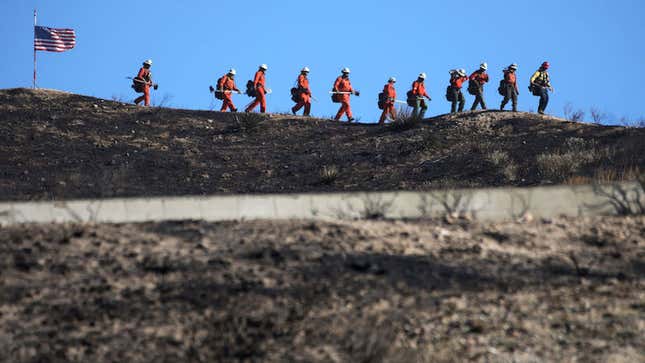
Amid the flames ravaging the state, California on Friday finally took a step to recognize the important contributions made by incarcerated firefighters over the years. A new law removes barriers that block inmates from pursuing professional firefighting careers after completing their sentences, giving them a second chance at life after prison.
Gov. Gavin Newsom signed AB 2147 on Friday at the site of the North Complex Fire, which has burned more than 252,000 acres and is currently 21% contained, according to Cal Fire. AB 2147 allows inmates that have participated in the California Department of Corrections and Rehabilitation’s fire camps to have their criminal records expunged. This would allow them to pursue an EMT certification, which municipal firefighting departments require for employment.
On Twitter, Newsom said that California’s inmate firefighting program was decades old and has long needed reform, adding that former prisoners should not be denied the right to become professional firefighters in the future.
“This legislation rights a historic wrong and recognizes the sacrifice of thousands of incarcerated people who have helped battle wildfires in our state, and I would like to thank the Legislature for passing this bill,” Newsom said in a statement.
Eloise Gomez Reyes, the assembly member who wrote the bill, said in a statement that the law was about giving second chances.
“Rehabilitation without strategies to ensure the formerly incarcerated have a career is a pathway to recidivism,” Gomez Reyes stated. “We must get serious about providing pathways for those that show the determination to turn their lives around.”
Former inmates will have to file a petition in county court to have their records expunged. The court also has the authority to wave their probation, parole or supervised release.
Inmates convicted of murder, rape, kidnapping, any felony punishable by death or a life sentence, sex offenses or arson, among others, would not qualify for relief under this law. Nonetheless, inmates convicted of certain crimes are not even eligible to participate in the state’s fire camps.
The state has 43 fire camps in 27 counties. In normal times, it counts on about 2,200 incarcerated people to work the fire-line. However, due to the novel coronavirus pandemic, those numbers are likely lower at the moment. California has been expediting the release of non-violent offenders to protect their health during the crisis. It has released at least 331 inmate firefighters since July in both standard and expedited release processes.
Although this law is undoubtedly good for former inmates who want to pursue a firefighting career, we shouldn’t forget what inmate firefighters have to deal with while they’re in the program. They make a jaw-dropping $5.12 a day wage, with an additional $1 an hour when they work the fire-line, to risk their lives fighting wildfires for the state.
Now, sure, this law will make it easier for some inmates to find jobs once they’re out of prison. However, it’s important that the people who are risking their lives to help the state be treated decently while they’re doing so—not just once they’ve been released—and that begins by giving inmates a decent wage.